Phyllis Edgerly Ring's Blog, page 40
June 13, 2014
A father’s gift of prayerful confidence
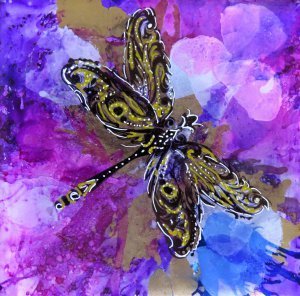
Painting: Judy Wright
Prayer is not asking. It is a longing of the soul. It is daily admission of one’s weakness. It is better in prayer to have a heart without words than words without a heart.
~ Mahatma Gandhi
As I reflect with gratitude on the role my children’s father has played in their lives, I recall the tone he set right from the start in connecting them with the resource of prayer.
Following surgery, our toddler daughter, returned from the recovery room swathed in medical tubing, looking lost in a cage-like crib that prevented us from reaching or touching her.
“Please say prayers,” her tiny, post-anesthesia voice croaked as we hung over her, feeling helpless. Not quite 3, and she already knew exactly what to do first in any uncertain situation. Her dad had stood over her every night at bedtime, from the day of her birth, and recited the prayer for healing she no doubt then also knew by heart.
When her younger brother came along, we whispered prayers into his tiny ears, too. Both children also saw our own prayers as a part of daily life. (“Thank you for being quiet now. Daddy is praying.”)
But one day, our small son showed me that using prayer and having confidence in it are very different things. I know instictively that this is something he learned from his dad. I was driving a pretty exciting sports car that my husband’s brother had loaned us while our own car was in the shop. As I was driving to pick up our son at his preschool, it started to snow. At first, it was just a pretty coating on the trees, but by the time I reached his school, wet snow was coming down fast and had covered the roads.

Painting: Judy Wright
I picked up our son, and as we pulled away from the school, seat belts safely fastened, the big racing tires on that car sent it into a frightening spin. After I regained control, I realized that it was going to be a very difficult drive home on twisting back roads. I was scared, and remember saying something out loud that was surely a prayerful plea.
I saw my son fold his hands, drop his head, and remain silent during that 20-minute crawl that usually took 10. When we reached our driveway, he released a large exhalation of relief and asked, “Is it OK to stop praying now?”
I looked at him, astonished, and realized that this was what he’d been doing as I’d struggled to get us home safely. And of course, his 5-year-old’s literal logic simply knew that those prayers had done their job, right?
The prayer he had used is one that many Baha’is throughout the world employ when faced with challenges: “Is there any Remover of difficulties save God? Say: Praised be God! He is God! All are His servants, and all abide by His bidding!”
This was a somewhat long prayer for such a small boy to have committed to memory. He referred to it at the time as the “e-mover.” He had, quite possibly, first begun to hear it said out loud when his father would say it when we saw an auto accident on the road as we traveled.
The unity and love in a family bestow gifts on every one of its members. The inner confidence our children learned from their father about the power of prayer continues to help me learn that everything benefits when prayer is applied to it, and that every answer, whatever its outward appearance, is a blessing.


June 10, 2014
Setting down the burdens
 As I traveled in Europe this spring, and in my childhood home of Germany, I had all sorts of plans for what I designated as writing time.
As I traveled in Europe this spring, and in my childhood home of Germany, I had all sorts of plans for what I designated as writing time.
And Life, smiling, laid waste to them with its wise, gentle love. It led straight to pieces of a book’s story I would never find on my own. And each time, as if a soft chorus echoed it, I’d feel the inner words: “Because now is the time. Because now, you are ready.”
I also heard my mother’s voice, which used to warn with a dire tone, “You can’t go home again.” Today, I can well understand her motivation, as a military spouse. Certain kinds of setting yourself up to believe and hope are a ticket to pain no mother wants to see for her child. Other wise words had reminded me, when I’d tend to set my my inner child’s nostalgic hopes on a place I’d loved so well: “Don’t mistake geography for your Reality.”
In these last nine weeks, a recognition finally came. You can’t return to the way things were. Yet you can come home to what you love about anything, right in your own heart. And the gateway, at least in this case, is grief, that wonderful, terrible angel of release, dogging us to face our burdens, to set them down at last. When we are ready, of course. 
I had known that the remaining portions of the novel I aim to finish would lead directly through that no man’s land that I have been trained to avoid. It brings the most confounding mixture of joy and wonderment with it.
Who else but Mary Oliver could provide the words that sum up such ineffables? And there her poem appeared before me, the day my journey came to its end:
HEAVY
That time
I thought I could not
go any closer to grief
without dying
I went closer,
and I did not die.
Surely God
had His hand in this,
as well as friends.
Still, I was bent,
and my laughter,
as the poets said,
was nowhere to be found.
Then said my friend Daniel
(brave even among lions),
“It’s not the weight you carry
but how you carry it—
books, bricks, grief—
it’s all in the way
you embrace it, balance it, carry it
when you cannot, and would not,
put it down.”
So I went practicing.
Have you noticed?
Have you heard
the laughter
that comes, now and again,
out of my startled mouth?
How I linger
to admire, admire, admire
the things of this world
that are kind, and maybe
also troubled—
roses in the wind,
the sea geese on the steep waves,
a love
to which there is no reply?
 “Heavy” by Mary Oliver, from Thirst: Poems. © Beacon Press, 2007.
“Heavy” by Mary Oliver, from Thirst: Poems. © Beacon Press, 2007.


June 6, 2014
Mysteries of grace

Painting, “Wild and Free” by Judy Wright
Gleanings found here and there:
There shall be eternal summer in the grateful heart.
~ Celia Laighton Thaxter
For most of us, enlightenment isn’t a sudden awakening, but a slow process of shining the light of consciousness onto those rejected, forgotten and denied impulses within. Most extraordinarily in this work, we discover that the lion’s share of the shadow is pure gold. Hidden in the dark we find our creative endowments – those things which make us most uniquely beautiful – and little by little, our divine inheritance can be fully claimed.
~ Toko-pa
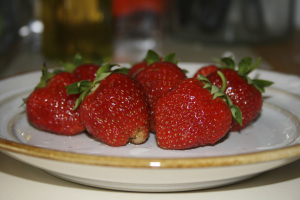
Photo: Saffron Moser
The mystery of God touches us — or does not — in the smallest details: giving a strawberry, with love; receiving a touch, with love; sharing the snapdragon red of an autumn sunset, with love.
~ Marion Woodman


June 3, 2014
Awareness needs both giving and receiving

Image: Lauren Chuslo-Shur
Can I recognize in my encounters with imperfection an invitation to accept that there is much I don’t know, or can’t change, especially about others?
How might I discover the limitless possibilities of love, of being open to the new possibilities in a situation or a moment? Might willingness to meet the present, rather than automatically imitate or recreate the past, be what it most truly means to “occupy” my self?
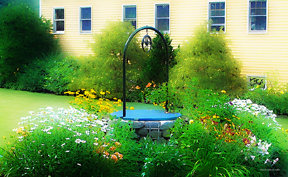
Image: Lauren Chuslo-Shur
The two service questions are conceived as a mechanism to help me focus on and clarify reality for myself in the decisions with which I am faced each day. Those junctures of possibility arrive moment by moment, and the goal of this pair of questions is to help me meet each one consciously as a servant of God:
~ At this moment in time, what is the act of service I am capable of giving that the other person is capable of receiving?
~ At this moment in time, what is the act of service I am capable of receiving that the other person is capable of giving?
Every human interaction is either an act of giving or an act of receiving. By asking questions that encompass both giving and receiving, my sensitivity to and awareness of my own needs and those of others is increased daily. Both questions are equally important because giving depends on someone willing and capable of receiving, and receiving depends on someone willing and capable of giving. 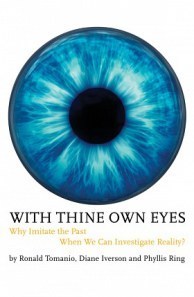
Adapted from With Thine Own Eyes: Why Imitate the Past, When We Can Investigate Reality?
Find the book at: http://www.amazon.com/With-Thine-Own-Eyes-Investigate-ebook/dp/B00I1JPC7I/ref=pd_sim_kstore_11?ie=UTF8&refRID=0TQC490J7FVBRTJWM70H
Also available in print version from: http://www.bahairesources.com/with-thine-own-eyes.html


May 30, 2014
Optical delusions on perception’s changing path
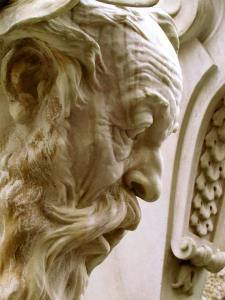
Photo: David Campbell / GBCTours.com
GLEANINGS FOUND HERE AND THERE:
A human being is a part of the whole called by us universe, a part limited in time and space. He experiences himself, his thoughts and feeling as something separated from the rest, a kind of optical delusion of his consciousness.
This delusion is a kind of prison for us, restricting us to our personal desires and to affection for a few persons nearest to us. Our task must be to free ourselves from this prison by widening our circle of compassion to embrace all living creatures and the whole of nature in its beauty.

Photo: Saffron Moser
~ Albert Einstein
What mindfulness slowly brings to our understanding is how much our experience is shaped by our minds.
To have that insight as a personal experience rather than something one reads in the growing body of scientific literature on the subject is transformational.
It loosens that reactivity which can trap us in a limiting loop, and allows for very different responses which can manifest in all kinds of ways – greater creativity, more empathy, more patience, less judgment.
~ Madeleine Bunting
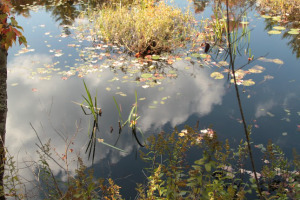
Photo: Nelson Ashberger
If the doors of perception were cleansed,
everything would appear to man as it is, infinite.
~ William Blake


May 28, 2014
An excellent and priceless Heritage
The thin eyelid prevents the eye from seeing the world and what is contained therein.
Then think of the result when the curtain of greed covers the sight of the heart.
~ Bahá’u’lláh, Tablet To The Persian Zoroastrian Believers

Image courtesy Jane E. Harper
Although the Realm of Glory hath none of the vanities of the world, yet within the treasury of trust and resignation We have bequeathed to Our heirs an excellent and priceless Heritage.
Earthly treasures We have not bequeathed, nor have We added such cares as they entail.
By God! In earthly riches fear is hidden and peril is concealed. … Fleeting are the riches of the world; all that perisheth and changeth is not, and hath never been, worthy of attention, except to a recognized measure.
~ Bahá’u’lláh


May 24, 2014
Letters give the gift of time

Photo: Nelson Ashberger
I wrote last time about the deliberate intimacy of the written word and how we share it in letters and correspondence.
A wonderful resource, Posterity: Letters of Great Americans to Their Children, from author Dorie McCullough Lawson shares three centuries of correspondence collected from the likes of Harriet Beecher Stowe, Ansel Adams, Jack London, Albert Einstein, Mary Todd Lincoln, Laura Ingalls Wilder and Thomas Edison. In addition to the good counsel they often share, these letters offer an intimate glimpse into families and relationships and represent the truest kind of history — the kind that’s people-based and gives us the most from which to learn.
In a wartime letter written as though penned by the family dog, Groucho Marx not only gave his soldier son plenty to laugh about during a tough time, but was able to express some of his deepest sentiments for his son, too.
Women’s-suffrage activist Elizabeth Cady Stanton wrote that she was “making the path smoother” for her own daughters and everyone else’s. 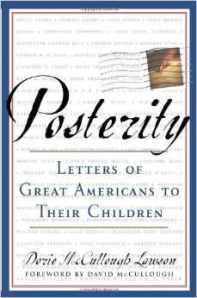
Illustrator N.C. Wyeth cautioned Andrew Wyeth: “There’s a real task on our hands, Andy. Modern art critics and their supine followers like the flat and the shallow.” Imagine how those words kept his artist son company in later years.
As historian David McCullough, father of the book’s author, observes so aptly in the book’s foreword, “Often the authors want only to save their children from making the mistakes they have.” Of course, while they can’t accomplish that, such “missives of love,” as he calls them, can at least keep the next generation company and give them heart and encouragement on the path. 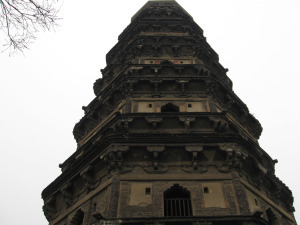
Within the letters our daughter sent us from China, we were able to see the heights and depths of the strong young woman she was becoming. These could be harder to see in crowded family gatherings or busy day-to-day details, when so much of what we “share” and “communicate” with each other involves so little of our truest feelings or best intentions. I remember how moved I was the day she told me that reading our letters, unlike talking with us, was like knowing more of who we really were — even more deeply.
Letters give both the writer and the recipient the opportunity to invest one of the most precious and rarest of resources in a relationship these days — time. You can’t write or read a letter and give your attention to anything else at the same time. It is truly a visit, and one that reminds us that what’s most real about our selves and our relationships absolutely transcends time and place.


May 21, 2014
The ink of light
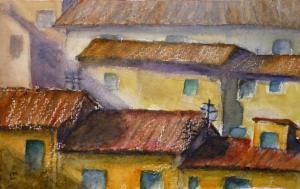
“Roofs of Tuscany”, Laura Moore Watercolours.
Shortly after my father died, I found some correspondence we’d exchanged years before. The letters gave me an observer’s view of my life at an age when I’d been blind to a number of things, ones I very much want to understand now. It was a gift to see those letters again.
Then, while cleaning out a drawer, I found the “Secret Friend” letters. Back when our children were small, they’d receive a postcard or letter every few weeks signed only with a small smiley face and the words “Secret Friend.”
Most often, the message offered encouragement, compliments or noted something positive that they’d done or that had happened in their life. Sometimes, if they were facing something difficult or had had a disappointment, it shared sympathy and support about that.
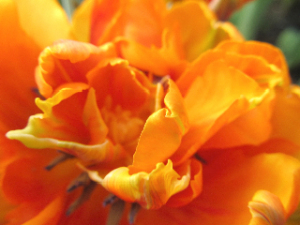
Photo: http://www.etsy.com/shop/DKirkupDesigns
It was quite a few years before our daughter picked up on the fact that the writing on those cards and letters looked a lot like the neat block-printing on her father’s engineering plans. Even then, she was kind enough not to point this out to her younger brother right away.
In addition to their appealing element of mystery, those little pieces of correspondence offered a periodic reminder that someone out there had the recipient’s interest and happiness in mind, and wished the best for them.
They were also a reminder for me that there is something powerfully important in the written word that seems to transcend every other communication experience. Each time I travel, and return to more exchanges via the written word, I appreciate this more deeply.
It’s undoubtedly no coincidence that the founder of every major religion brought a book, each its own kind of letter to humanity. “Write all that We have revealed unto thee with the ink of light upon the tablet of thy spirit,” Bahá’u’lláh encourages humanity, soul-by-soul. “Should this not be in thy power, then make thine ink of the essence of thy heart.”
 Adapted from Life at First Sight: Finding the Divine in the Details –
Adapted from Life at First Sight: Finding the Divine in the Details –


May 18, 2014
Our innermost happenings
Gleanings found here and there:
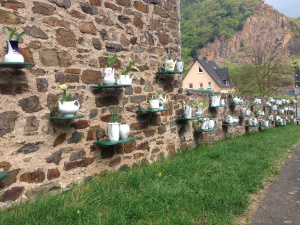 Think, dear friend, reflect on the world that you carry within yourself. And name this thinking what you wish … Just be sure that you observe carefully what wells up within you and place that above everything that you notice around you. Your innermost happening is worth all your love. You must somehow work on that.
Think, dear friend, reflect on the world that you carry within yourself. And name this thinking what you wish … Just be sure that you observe carefully what wells up within you and place that above everything that you notice around you. Your innermost happening is worth all your love. You must somehow work on that.
~ Rainer Maria Rilke
Most people treat the present moment as if it were an obstacle that they need to overcome. Since the present moment is life itself, it is an insane way to live.
Get a life in which you notice the smell of salt water pushing itself on a breeze over the dunes, a life in which you stop and watch how a red-tailed hawk circles over a pond and a stand of pines.
Get a life in which you pay attention to the baby as she scowls with concentration when she tries to pick up a Cheerio with her thumb and first finger.
~ Anna Quindlen


May 15, 2014
The blessed way of not knowing
 Immersed in a book’s writing process once again, I’m reminded daily that faithfulness to this process involves being present to discover what is ready to be revealed, rather than trying to impose anything.
Immersed in a book’s writing process once again, I’m reminded daily that faithfulness to this process involves being present to discover what is ready to be revealed, rather than trying to impose anything.
In addition to the pages it generates, writing, like all creative endeavor, is an invitation to authenticity — a powerful and liberating experience of investigation and discovery, as life itself is meant to be.
Creative process’s greatest gift may be the way that it leads quite naturally to the harmonizing of heart and mind as collaborators in a journey of learning and expression, in service to truth. In fact, it requires this harmonizing and partnership, this dynamic balance. 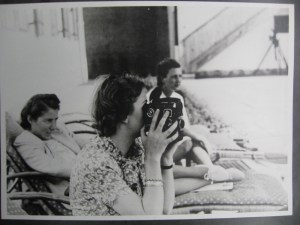
I find that while my focus and intent must train in like a camera, they must also merge in a kind of surrender that my mind can’t ever fully grasp or encompass, but my spirit can recognize, and respond to. Indeed, my mind must become a servant to that surrender, and whatever it is that spirit can draw from and impart to it. 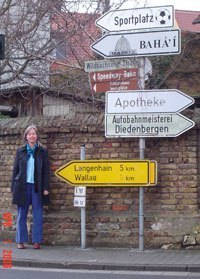
“The intuitive mind is a sacred gift, and the rational mind is a faithful servant,” Albert Einstein said, adding, “We have created a society that honors the servant and has forgotten the gift.”
I am writing out of my own search. Authenticity comes from keeping the commitment, while not knowing, something I consider sacred practice.
I am devotee to the experience of the discovery, on its own terms. What that “sacred gift” will bestow.







